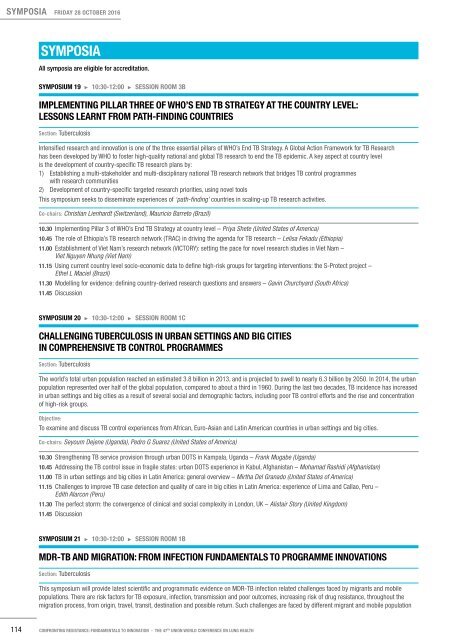TO INNOVATIONS
2f3gIP7
2f3gIP7
Create successful ePaper yourself
Turn your PDF publications into a flip-book with our unique Google optimized e-Paper software.
SYMPOSIA FRIDAY 28 OC<strong>TO</strong>BER 2016<br />
SYMPOSIA<br />
All symposia are eligible for accreditation.<br />
SYMPOSIUM 19 3 10:30-12:00 3 SESSION ROOM 3B<br />
IMPLEMENTING PILLAR THREE OF WHO’S END TB STRATEGY AT THE COUNTRY LEVEL:<br />
LESSONS LEARNT FROM PATH-FINDING COUNTRIES<br />
Section: Tuberculosis<br />
Intensified research and innovation is one of the three essential pillars of WHO’s End TB Strategy. A Global Action Framework for TB Research<br />
has been developed by WHO to foster high-quality national and global TB research to end the TB epidemic. A key aspect at country level<br />
is the development of country-specific TB research plans by:<br />
1) Establishing a multi-stakeholder and multi-disciplinary national TB research network that bridges TB control programmes<br />
with research communities<br />
2) Development of country-specific targeted research priorities, using novel tools<br />
This symposium seeks to disseminate experiences of ‘path-finding’ countries in scaling-up TB research activities.<br />
Co-chairs: Christian Lienhardt (Switzerland), Mauricio Barreto (Brazil)<br />
10.30 Implementing Pillar 3 of WHO’s End TB Strategy at country level – Priya Shete (United States of America)<br />
10.45 The role of Ethiopia’s TB research network (TRAC) in driving the agenda for TB research – Lelisa Fekadu (Ethiopia)<br />
11.00 Establishment of Viet Nam’s research network (VIC<strong>TO</strong>RY): setting the pace for novel research studies in Viet Nam –<br />
Viet Nguyen Nhung (Viet Nam)<br />
11.15 Using current country level socio-economic data to define high-risk groups for targeting interventions: the S-Protect project –<br />
Ethel L Maciel (Brazil)<br />
11.30 Modelling for evidence: defining country-derived research questions and answers – Gavin Churchyard (South Africa)<br />
11.45 Discussion<br />
SYMPOSIUM 20 3 10:30-12:00 3 SESSION ROOM 1C<br />
CHALLENGING TUBERCULOSIS IN URBAN SETTINGS AND BIG CITIES<br />
IN COMPREHENSIVE TB CONTROL PROGRAMMES<br />
Section: Tuberculosis<br />
The world’s total urban population reached an estimated 3.8 billion in 2013, and is projected to swell to nearly 6.3 billion by 2050. In 2014, the urban<br />
population represented over half of the global population, compared to about a third in 1960. During the last two decades, TB incidence has increased<br />
in urban settings and big cities as a result of several social and demographic factors, including poor TB control efforts and the rise and concentration<br />
of high-risk groups.<br />
Objective:<br />
To examine and discuss TB control experiences from African, Euro-Asian and Latin American countries in urban settings and big cities.<br />
Co-chairs: Seyoum Dejene (Uganda), Pedro G Suarez (United States of America)<br />
10.30 Strengthening TB service provision through urban DOTS in Kampala, Uganda – Frank Mugabe (Uganda)<br />
10.45 Addressing the TB control issue in fragile states: urban DOTS experience in Kabul, Afghanistan – Mohamad Rashidi (Afghanistan)<br />
11.00 TB in urban settings and big cities in Latin America: general overview – Mirtha Del Granado (United States of America)<br />
11.15 Challenges to improve TB case detection and quality of care in big cities in Latin America: experience of Lima and Callao, Peru –<br />
Edith Alarcon (Peru)<br />
11.30 The perfect storm: the convergence of clinical and social complexity in London, UK – Alistair Story (United Kingdom)<br />
11.45 Discussion<br />
SYMPOSIUM 21 3 10:30-12:00 3 SESSION ROOM 1B<br />
MDR-TB AND MIGRATION: FROM INFECTION FUNDAMENTALS <strong>TO</strong> PROGRAMME <strong>INNOVATIONS</strong><br />
Section: Tuberculosis<br />
This symposium will provide latest scientific and programmatic evidence on MDR-TB infection related challenges faced by migrants and mobile<br />
populations. There are risk factors for TB exposure, infection, transmission and poor outcomes, increasing risk of drug resistance, throughout the<br />
migration process, from origin, travel, transit, destination and possible return. Such challenges are faced by different migrant and mobile population<br />
114 CONFRONTING RESISTANCE: FUNDAMENTALS <strong>TO</strong> INNOVATION - THE 47 TH UNION WORLD CONFERENCE ON LUNG HEALTH


